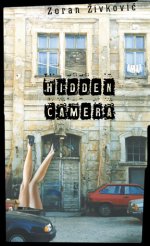
| Hidden Camera | ||||||||
| Zoran Živković, translated by Alice Copple-Tošić | ||||||||
| Dalkey Archive Press, 217 pages | ||||||||
|
A review by Georges T. Dodds
Like Lem, Živković's Hidden Camera is told, as is much Eastern European literature, in the
first-person style of a teller of tall tales you might meet and, were he Živković, share a few Jelen
pivo — or more likely shots of šljivovica -- in some out-of-the-way basement pub in Belgrade. While
Hidden Camera somewhat resembles a dream in its episodic nature, linked by quasi-non-sequitur shifts
in the action, it at first is a fascinating trip to go along on. However, after awhile, one begins to
wonder, "What's the point?" "Why are these people harassing this poor sod?" and the answers aren't really
forthcoming. Perhaps there is some philosophical meaning or resolution in all this, the fact that the
narrator is an undertaker and that the final scene is that of a woman giving birth might suggest this —
but this interpretation certainly isn't explicit, and any number of others one might come with (Big Brother
among us, societal voyeurism) aren't either. Yes, I realize not every work of fiction has to provide an explicit
resolution, that would reduce everything to the level of blockbuster Hollywood movies, still, like Mr. Toon,
while I would like to believe that Živković's work is deeply meaningful and high-brow, I just don't
get it, which leaves me to rely on the more prosaic elements of the work. Hidden Camera reads well,
is entertain, which, while entertaining on a first reading, leave me when I attempt to draw anything further
from its pages, rather muddled.
Certainly, for those wanting to read anything outside the more straightforward yet perhaps less rewarding works of
standard English-language SF, Živković is an interesting writer, who handles old themes in a manner that
on occasion reveals some of their old lustre. Certainly if you like the works of Čapek and Lem, you'll
enjoy Živković, and if not you can see it as a way to open your horizons.
Georges Dodds is a research scientist in vegetable crop physiology, who for close to 25 years has read and collected close to 2000 titles of predominantly pre-1950 science-fiction and fantasy, both in English and French. He writes columns on early imaginative literature for WARP, the newsletter/fanzine of the Montreal Science Fiction and Fantasy Association and maintains a site reflecting his tastes in imaginative literature. |
|||||||
|
|
If you find any errors, typos or anything else worth mentioning,
please send it to editor@sfsite.com.
Copyright © 1996-2014 SF Site All Rights Reserved Worldwide
